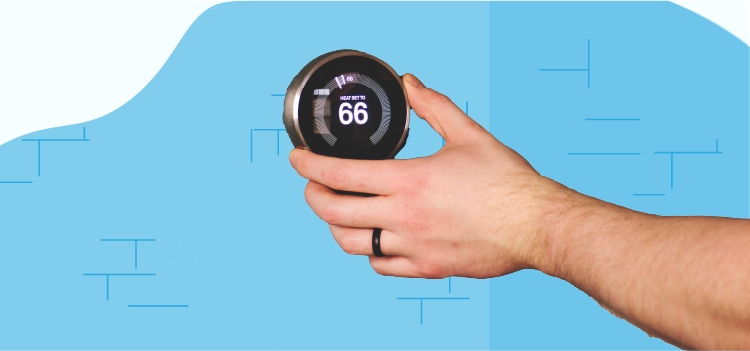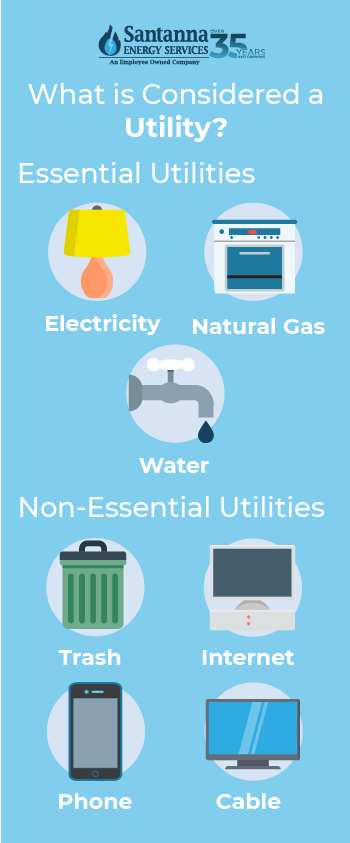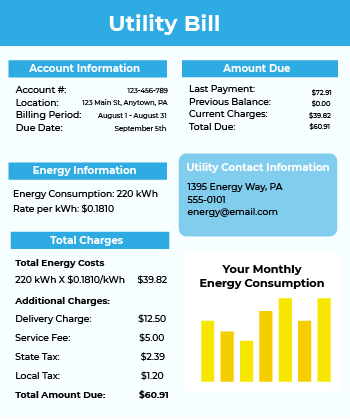What is Considered a Utility Bill?
by Tyler Castle
19 min read

For new homeowners and seasoned homeowners alike, knowing what’s considered a utility bill is paramount to a financially stable home. Utility bills are a regular part of household life, covering the costs of essential services that keep our homes running smoothly. But what exactly falls under the umbrella of a utility bill?
No need to wonder anymore. We’re covering everything from types, average costs, and tips on how to manage your bills more effectively. Whether you’re a new homeowner or just looking to get a better grasp on your monthly bills, this guide will help you navigate the world of utilities with confidence.
Key Points of This Article:
- A utility bill is a monthly statement that charges for essential household services such as electricity, gas, water, internet, and trash collection.
- These bills list key details including account information, service type, usage amounts, rates, fees, taxes, and total payment due.
- Utility costs vary based on factors like weather, usage habits, plan type, and location, and reviewing bills regularly helps with budgeting and efficient resource use.
- Managing utilities effectively involves tracking usage, setting a budget, using energy‑saving practices, and choosing the right provider and plan for your needs.
For new homeowners and seasoned homeowners alike, knowing what’s considered a utility bill is paramount to a financially stable home. Utility bills are a regular part of household life, covering the costs of essential services that keep our homes running smoothly. But what exactly falls under the umbrella of a utility bill?
No need to wonder anymore. We’re covering everything from types, average costs, and tips on how to manage your bills more effectively. Whether you’re a new homeowner or just looking to get a better grasp on your monthly bills, this guide will help you navigate the world of utilities with confidence.
What is a utility bill?
A utility bill is a statement that reflects the cost of essential services provided to your home. A utility bill’s main purpose is to inform consumers of the cost of services like electricity, gas, and water, and to collect payment.
Utility bills are generally issued on a monthly basis, although the frequency can vary depending on the service provider. Utility bills detail the amount of energy or resources you’ve used during a certain billing period, along with any applicable taxes, fees, or surcharges.
What is considered a utility bill?
A utility bill is considered any statement that charges for essential services provided to your home. Here are some of the most common you’ll see on your utility bill:
Electricity
Electricity bills cover the cost of supplying power to you. Common charges might include the cost of energy consumed and delivery charges for maintaining the electrical grid. Electricity is measured in kilowatt-hours (kWh) which accounts for the amount of energy consumed over your bill period. Your electricity bill typically breaks down the rate you pay per kWh, allowing you to see how much you’re being charged for the energy you use.
Gas
Gas bills pertain to the supply of natural gas used for heating, cooking, and water heating. Gas usage is measured in therms, with one therm equaling 100,000 British thermal units (BTUs), which quantifies the energy content of the gas consumed. Your gas bill typically includes charges for the amount of gas used during the billing period. There may be some additional charges for delivery fees for maintaining the gas pipelines and ensuring a consistent supply to your home.
Water
Water bills reflect the cost of water supplied for household use, including drinking, bathing, and irrigation. Common charges include water consumption & sewer services. Water usage is typically measured in gallons or cubic feet.
Costs can vary based on the volume of water used, tiered pricing structures, and the need for wastewater treatment. Keep track of your water usage by learning how to find and read your water meter!
What information is on a utility bill?
A utility bill typically includes key details about your service, usage, and payment responsibilities. Understanding the information on your bill can help you track your consumption, manage costs, and avoid late fees.
Here’s what you can usually find:
Account Information: Your bill will commonly include your account number, name, and service address, along with contact details for your utility provider. This section is essential for customer support or making changes to your account.
Service Details: The service details portion of your bill outlines the type of utility service you receive—such as electricity, gas, water, or internet. It also includes your meter number and the billing period covered.
Usage Summary: Here, you’ll see a record of how much energy, water, or other resources you’ve used during the billing cycle. Many bills include graphs or comparisons to show usage trends over time.
Charges and Rates: This section provides a detailed breakdown of your costs, including base service fees, taxes, and any applicable rate adjustments. If you’ve incurred late fees or received credits, they’ll be listed here as well.
Payment Information: Your total amount due and due date are clearly displayed, along with available payment methods and instructions for submitting your payment.
Messages or Notices: Many utility bills feature important updates, such as upcoming rate changes, seasonal energy-saving tips, or notifications about planned service interruptions.
Is a Phone Bill Considered a Utility Bill?
A phone bill can be considered a utility by some. Cell phones have largely replaced landlines and are viewed as essential for communication, navigation, and internet access. Although cell phones are not universally classified as utilities, many people include their cell phone bills in their utility expenses, similar to traditional phone lines.
Is an Internet Bill Considered a Utility Bill?
For most people, the internet is considered a utility. With its role in enabling remote work, online education, streaming entertainment, and managing smart home devices, the internet has become as essential as electricity or water for many households. While not traditionally classified as a utility in legal terms, it is treated as such in practical everyday life due to its necessity.
Is a Trash Bill Considered a Utility Bill?
Trash bill is often considered a utility. These services are essential for maintaining public health and cleanliness, and they are typically managed at the local level. In some regions, the cost of trash and recycling is included in city taxes or homeowner association (HOA) fees, so you may not receive a separate bill. However, in other cases, you might be directly billed by a private waste management company. Regardless of how they are billed, these services are widely recognized as part of utility expenses.
Is Car Insurance Considered a Utility Bill?
Car insurance is not considered a utility bill. Utilities typically refer to services that are essential for the operation and maintenance of a household, such as electricity, water, or internet. Car insurance, while necessary for vehicle ownership and operation, falls under the category of financial protection rather than a household utility. It is a distinct expense separate from utilities.
Is Cable a Utility Bill?
For some people, a cable bill is considered a utility. While the popularity of cable TV has declined with the rise of streaming services, millions of Americans still rely on it for news, entertainment, and live sports. For households that prioritize cable, the monthly bill is often grouped with other utility expenses, even though it is not universally considered a utility.
Factors that might influence a shift in your utility bill
Keep in mind that your utility bill might not look the same month-to-month. Certain factors can influence your monthly billing amount like:
Seasonal Demand: If you’re on an electricity or gas plan where your rate varies month-to-month like a variable-rate plan, you could be subjecting yourself to higher energy costs when the market gets tough.
Weather: Depending on your plan type, if you’re not on an electricity or gas plan that protects you from rate increases during hot summers or cold winters, you could see your utility bill shift upwards.
Usage Patterns: This goes for almost all your utilities. The more or less you use your essential services will be reflected in your bill. Ensure to monitor your consumption habits during the month to avoid unnecessary overspending.
Your Location: Utility rates for electricity and gas are different from state to state. This is because of energy regulation and deregulation which influences who your options are for utility providers.
Importance of utility bills
Utilities play a role in budget allocation. Utility bills are a significant part of household expenses and play a critical role in budget planning. Regular monitoring and timely payments help prevent financial strain and allow for better management of cash flow.
Utility bills help track expenses and usage patterns. Bills provide a detailed record of usage over time, helping consumers track their consumption patterns. Understanding utility bills can motivate consumers to use resources more efficiently, reducing both environmental impact and costs. Regular review of your utility bills fosters mindful consumption, encouraging individuals to make more sustainable choices.
Timely payment of utility bills can contribute positively to your credit history. Timely payments can also allow you to avoid late fees or added charges to ensure your household budget remains on track.
Most importantly, utility bills are a necessary part of running a household. They cover essential services like electricity, gas, water, and waste management, which are crucial for maintaining a comfortable and functional living environment.
Components of utility bills
Utility bills typically break your usage into organized sections for easy readability:
Energy Usage Charges: A portion of your bill will show how much of that utility you’ve consumed, whether it’s measured in therms (for gas), kilowatt-hours (kWh) (for electricity), or gallons (for water).
Your bill will be broken down by the rate you’ve been charged for your utility. Keep in mind these rates could fluctuate based on factors like weather conditions or your plan type. Your total usage for the billing period is then multiplied by the applicable rate, resulting in the amount due for that service.
Delivery Charges: Delivery charges on a utility bill refer to the costs associated with transporting the utility service—whether it’s electricity, gas, or water—from the provider to your home. These charges cover the maintenance of infrastructure, such as power lines, gas pipelines, and water mains, as well as the operational costs needed to ensure reliable service.
Government Incentives: If applicable, various federal and state programs offer rebates or incentives for adopting energy-efficient appliances, renewable energy systems, or water-saving technologies. If you’ve signed up for these incentive programs through your utility provider, you could see these rebates reflected in your monthly bill.
Renewable Energy Certificates/Credits (RECs): RECs are a way to incentivize and encourage renewable energy creation. Typically bought by companies and businesses, RECs allow businesses to claim they’re using renewable energy which can encourage others to do the same. Credits and ongoing incentives from this purchase could be represented on your utility bill.
Types of Billing Cycles for Utility Bills
Utility bills are typically structured into different billing cycles, which determine when and how often payments are due. Understanding these cycles can help you plan your budget and avoid missed payments. Here are the common types of billing cycles and the services they typically apply to:
Monthly Cycle
This is the most common billing cycle, repeating every month on a fixed date. Monthly cycles are typically used for essential household bills like rent, electricity, water, and gas. This regularity allows for consistent budgeting, as the same bills are due at the same time each month, making it easier to track and manage expenses.
Quarterly Cycle
Operating on a three-month interval, this cycle requires payments every quarter. Quarterly billing is often used for services such as phone recharges, internet services, or certain maintenance agreements. It may be advantageous for customers looking to reduce the frequency of payments but can require more substantial funds at each billing period, making budgeting important.
Bi-Weekly Cycle
Payments in this cycle are made every two weeks and are less common for household utilities. Bi-weekly billing is typically reserved for specific services such as waste management or payroll deductions for utility-related services. While this cycle may require more frequent attention, it can help spread out costs more evenly across the month, offering flexibility in managing expenses.
Annual Cycle
This cycle involves a single payment made once a year. Annual billing is common for services like insurance premiums, streaming subscriptions, or license renewals. This cycle often comes with discounts for paying upfront but requires advanced planning to ensure funds are available for the larger one-time payment.
Utility bill examples
Utility bills often show a clear breakdown of charges based on usage, making it easier to understand how different factors (e.g., heating, cooling, water consumption) contribute to the overall cost.
Average utility costs can vary significantly by region, influenced by factors like climate, local rates, and the availability of resources. For example, heating costs in colder climates are generally higher, while water bills may be lower in areas with abundant supply.
Example: Ohio electricity bill
Let’s say hypothetically, you live in Ohio where the average electricity rate is 11.04 cents per kilowatt-hour and you’ve consumed 800 kWh of energy for the month.
To find your total electricity cost, your provider will take 800 kWh X $0.1104/kWh = $88.32.
This $88.32 represents the cost of the electricity you’ve used. However, your bill might include additional charges such as taxes, service fees, or delivery charges.
However, your bill might include additional charges such as taxes, service fees, or delivery charges. Using the average kilowatt-hour for a resident living in Pennsylvania and hypothetical fees, here’s what your bill might look like:
Utility Bill for August 2024
Service Address: 123 Main St, Anytown, OH
Billing Period: August 1, 2024 – August 31, 2024
Electricity Usage:
Energy Consumption: 880 kWh
Rate per kWh: $0.1104
Total Energy Cost: $88.32
Additional Charges:
Delivery Charge: $12.50
Service Fee: $5.00
State Tax: $2.39
Local Tax: $1.20
Total Amount Due $109.41
How to read your utility bill
Typically, the top of your utility bill will show your account number with your utility which you can use to access online billing. You’ll also find the billing period—the dates for which you are being charged, usually on a monthly basis—and your physical address, where the utility services are provided.
Towards the middle of your bill, you’ll see a summary of your charges typically showing what you paid last month and the total amount of your current bill.
Next, there’s a section dedicated to the amount of electricity, gas, or water you’ve used during the billing period. Some utilities provide a meter reading or graph showing your energy patterns throughout the month. Here, you’ll also find the cost per unit of energy and an itemized list of charges such as supply, delivery, service fees, and taxes. The bill concludes with a grand total of your energy usage and any additional fees that are due for payment.
Other components of your bill could include utility announcements and alerts as well as contact information to get in touch with your provider.
Average monthly utility bill by state
Average Utility Bill in Ohio, Pennsylvania, Illinois, and Michigan
| State | Electricity | Natural Gas | Water | Water |
|---|---|---|---|---|
| Ohio | $112.21 | $148 | $27 | $25 |
| Pennsylvania | $117.11 | $103 | $31 | $30 |
| Illinois | $95.86 | $97 | $26 | $30 |
| Michigan | $117.57 | $74 | $29 | $30 |
*Amounts in this chart were sourced from this article from the Bureau of Labor Statistics, the Energy Information Administration and Energy.gov and are monthly rates.
Budgeting for home utilities
Track Your Utility Usage: Monitor and record your monthly utility bills to understand your consumption patterns and costs over time. This can help preserve resources and give you insight into how you can make your home more energy efficient.
Set a Monthly Utility Budget: Allocate a specific amount for utilities in your monthly budget based on past usage and expected seasonal changes. This will ensure you’ll have the right amount of money put aside when your bill comes for timely payments.
Use Budgeting Apps or Strategies: Utilize apps or spreadsheets to help track and manage your utility expenses. The 50/30/20 budget rule is just one example of a helpful budgeting tip.
Enroll in Budget Billing Programs: Some utility companies offer budget billing plans that average your bills over the year. However, budget billing is not ideal because of monthly market fluctuations.
Automate Your Payments: Set up automatic payments to ensure bills are paid on time, avoiding late fees and managing cash flow.
Tips for managing and reducing utility bills
- Replace incandescent bulbs with LED bulbs, which use up to 75% less energy and last significantly longer.
- Invest in smart power strips that automatically shut off power to devices that are in standby mode.
- Consider an energy monitoring system that allows you to automatically adjust your appliances when they’re using too much energy.
- Install low-flow showerheads to help regulate water use.
- Use caulking and weatherstripping to seal gaps around windows and doors to prevent drafts and heat loss.
- Upgrade to energy-efficient appliances, which consume less energy and can potentially lower your utility bills.
What if you can’t pay your utility bills?
If you can’t pay your utility bills, some states and providers offer assistance to low-income households with paying their energy bills. Additionally, many utility companies have payment plans, hardship programs, or emergency assistance options that can temporarily reduce or defer your payments.
Why your energy choice matters when it comes to utilities
In the end, the right provider makes all the difference when it comes to utilities. Choosing the right utility provider could open you up to a world of new and creative plan types that are perfect for your lifestyle. A few electricity and gas plan types include:
- Fixed Plans: Offer consistent rates for a set term, providing predictability in your energy costs. Ideal for those who prefer stability and want to avoid market fluctuations.
- Variable Plans: Rates change based on market conditions but offer the risk of higher costs when rates rise.
- Unlimited Energy Plans: Often referred to as “flat” plans can offer predictability in your monthly bills as the supply portion of your bill doesn’t change.*
The type of energy source from utilities (e.g., natural gas, coal, renewables) can make an environmental impact. To help combat this, some energy providers offer earth-friendly energy plans that aim to offset carbon emissions and more.
Reliable customer service is crucial when dealing with utility issues or billing concerns. Choosing an energy supplier known for strong customer support can help resolve issues more quickly and ensure a better overall experience.
FAQ’s
Why is my utility bill so high?
Several factors can contribute to a high utility bill, including weather, location, and your utility plan type.
Weather: Extreme weather conditions, such as very hot summers or cold winters, can significantly impact your utility bill. During these times, heating and cooling systems tend to work harder and run longer, leading to increased energy consumption.
Location: Utility rates vary widely depending on your geographic location due to differences in energy sources, local infrastructure, and regulatory policies.
Plan type: Some plans fluctuate based on market conditions while other plans offer the option to lock in a specific rate for a set period, offering predictability.
For more reasons why your utility bill is high, visit our blogs for electricity and gas now!
Are Utility Bills Public Records?
Utility bills are not public records, as they contain private and sensitive information.
Details such as credit card numbers, Social Security numbers, account numbers, and security codes are protected by law and must be removed before any records are shared publicly. While aggregate monthly billing data may be available for public inspection, individual usage details, such as daily or hourly breakdowns, remain confidential.
Additionally, customers with valid protection orders can request their identifying information to remain confidential, ensuring their safety and privacy. Records that could expose vulnerabilities in utility systems or disrupt services are also kept private for security reasons.
How to add my spouse’s name to my utility bill?
If you’re looking to add your spouse’s name to your utility bill, here’s what you could expect:
- Gather Necessary Information: Collect your account details, your spouse’s full name, and any other identification that may be required, such as a government ID or proof of address.
- Contact Your Utility Provider: Reach out to your utility company via phone, email, or online account services. Ask about their process for adding a name to your account.
- Request to Add a Name:Inform the representative that you’d like to add your spouse’s name to the utility bill.
- Complete Any Required Forms: You may need to fill out a form or provide additional documentation to authorize the change. Some companies might allow you to complete this online, while others may require you to submit paperwork.
- Review and Confirm the Changes: Once the request is processed, review your next utility bill to ensure your spouse’s name appears correctly.
Does paying your utility bills build credit?
Paying your utility bills on time can help build your credit if the payments are reported to credit bureaus.
Your payment history plays a significant role in determining your credit score. Consistently paying your utility, rent, and phone bills on time can have a positive impact if this information is shared with credit bureaus.
However, missed or late payments can hurt your credit score and affect your creditworthiness, so it’s crucial to stay up to date with all your bills to avoid negative consequences.
Can you have two names on your utility bill?
Yes, you can generally have two names on a utility bill. This is often done when two or more people share responsibility for the household’s utility expenses.
Utility bills are an essential part of managing a household, and understanding their components, billing cycles, and impact on your finances can help you stay organized and in control. Whether it’s keeping track of payments, budgeting for monthly expenses, or knowing how utilities influence your credit, being informed ensures you can make smarter decisions. By staying proactive and consistent with your payments, you can avoid unnecessary stress and maintain a smooth-running home.
* Restrictions apply. Enrollment based upon program eligibility. Customers using more than 125% of normal monthly usage as determined by Santanna may be required to switch plans.
There’s peace of mind in knowing you’ll pay the same monthly supply cost amount for your electricity or natural gas supply without any uncertainty — no matter what. Santanna’s Unlimited Energy option protects your bills from fluctuating supply charges no matter the changes in seasons. For over 35 years, Santanna has served customers in Illinois, Indiana, Pennsylvania, Michigan, and Ohio. Our mission is to provide innovative and cost-effective energy solutions that will help our customers achieve their energy goals.
Tyler is an experienced energy professional, having worked for Santanna Energy Services, for the past four years. He is passionate about renewable energy and believes that diversifying the energy grid is the key to a sustainable future. Tyler is dedicated to supplying consumers with the best possible energy solutions and works diligently to make sure that Santanna can deliver the highest quality service.









